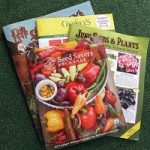Savoring Seed Catalogs
There’s a surefire way to tell we are in the depths of winter. It’s the arrival of garden seed catalogs in the mail. We get many at Winding Pathways.

Seed catalogs make great winter reading.
Some come from massive companies that sell a wide range of flower and vegetable seeds plus tree seedlings and garden supplies. Others are from companies that specialize in one type of seed or plant, like fruit tree seedlings or prairie plants.
We buy vegetable seeds in late winter from either the Dutchman’s Store in Cantril, Iowa, or the Stringtown Grocery near Kalona, Iowa. Both are run by Mennonites or Amish people and sell bulk seeds. Scoop a spoonful from a large jar and deposit them in a small envelope. Then write the code and vegetable name on the envelope and pay on the way out. We’ve found the seeds to be of excellent quality and much less expensive than similar ones sold in stores or through catalogs or the computer.
Not everyone has access to a bulk seed store, so buying prepackaged seeds makes sense. Sometimes seed catalogs list vegetable varieties we want to try and can’t get otherwise. This year, for example, we will plant a new dwarf winter squash. The vines are short and the fruits just the right size for two people.
We usually buy trees from the National Arbor Day Foundation, and prairie plants from Prairie Moon Nursery. Arbor Day Foundation trees are small but we’ve had excellent results from them, and they are inexpensive.
In early 2020 we plan to convert about 3,000 square feet of lawn to low profile pollinator habitat. We’ll buy a prairie seed mix from Pheasants Forever (pfhabitatstore.com). They have many mixes available that are suitable for different soils. They are most appropriate for larger areas.
Happy Planning and Planting.


Prairie Nursery in Westfield, Wisconsin is another excellent resource for native plants. I always look forward to their catalog.
Thank you, Brenda!
I’m on the hunt for a sycamore tree. I love the bark, the shape of the leaves, and shape of the tree trunk and its glorious gray/white branches waving to the heavens. Hope I find it soon. (: